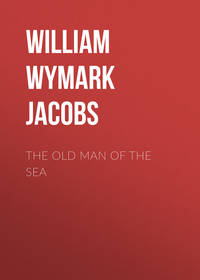Kitobni fayl sifatida yuklab bo'lmaydi, lekin bizning ilovamizda yoki veb-saytda onlayn o'qilishi mumkin.
Kitobni o'qish: «The Old Man of the Sea»
THE OLD MAN OF THE SEA
"What I want you to do," said Mr. George Wright, as he leaned towards the old sailor, "is to be an uncle to me."
"Aye, aye," said the mystified Mr. Kemp, pausing with a mug of beer midway to his lips.
"A rich uncle," continued the young man, lowering his voice to prevent any keen ears in the next bar from acquiring useless knowledge. "An uncle from New Zealand, who is going to leave me all 'is money."
"Where's it coming from?" demanded Mr. Kemp, with a little excitement.
"It ain't coming," was the reply. "You've only got to say you've got it. Fact of the matter is, I've got my eye on a young lady; there's another chap after 'er too, and if she thought I'd got a rich uncle it might make all the difference. She knows I 'ad an uncle that went to New Zealand and was never heard of since. That's what made me think of it."
Mr. Kemp drank his beer in thoughtful silence. "How can I be a rich uncle without any brass?" he inquired at length.
"I should 'ave to lend you some—a little," said Mr. Wright.
The old man pondered. "I've had money lent me before," he said, candidly, "but I can't call to mind ever paying it back. I always meant to, but that's as far as it got."
"It don't matter," said the other. "It'll only be for a little while, and then you'll 'ave a letter calling you back to New Zealand. See? And you'll go back, promising to come home in a year's time, after you've wound up your business, and leave us all your money. See?"
Mr. Kemp scratched the back of his neck. "But she's sure to find it out in time," he objected.
"P'r'aps," said Mr. Wright. "And p'r'aps not. There'll be plenty of time for me to get married before she does, and you could write back and say you had got married yourself, or given your money to a hospital."
He ordered some more beer for Mr. Kemp, and in a low voice gave him as much of the family history as he considered necessary.
"I've only known you for about ten days," he concluded, "but I'd sooner trust you than people I've known for years."
"I took a fancy to you the moment I set eyes on you," rejoined Mr. Kemp. "You're the living image of a young fellow that lent me five pounds once, and was drowned afore my eyes the week after. He 'ad a bit of a squint, and I s'pose that's how he came to fall overboard."
He emptied his mug, and then, accompanied by Mr. Wright, fetched his sea- chest from the boarding-house where he was staying, and took it to the young man's lodgings. Fortunately for the latter's pocket the chest contained a good best suit and boots, and the only expenses incurred were for a large, soft felt hat and a gilded watch and chain. Dressed in his best, with a bulging pocket-book in his breast-pocket, he set out with Mr. Wright on the following evening to make his first call.
Mr. Wright, who was also in his best clothes, led the way to a small tobacconist's in a side street off the Mile End Road, and, raising his hat with some ceremony, shook hands with a good-looking young woman who stood behind the counter: Mr. Kemp, adopting an air of scornful dignity intended to indicate the possession of great wealth, waited.
"This is my uncle," said Mr. Wright, speaking rapidly, "from New Zealand, the one I spoke to you about. He turned up last night, and you might have knocked me down with a feather. The last person in the world I expected to see."
Mr. Kemp, in a good rolling voice, said, "Good evening, miss; I hope you are well," and, subsiding into a chair, asked for a cigar. His surprise when he found that the best cigar they stocked only cost sixpence almost assumed the dimensions of a grievance.
"It'll do to go on with," he said, smelling it suspiciously. "Have you got change for a fifty-pound note?"
Miss Bradshaw, concealing her surprise by an effort, said that she would see, and was scanning the contents of a drawer, when Mr. Kemp in some haste discovered a few odd sovereigns in his waistcoat-pocket. Five minutes later he was sitting in the little room behind the shop, holding forth to an admiring audience.
